Human Rights

Working Paper 201/2025: A Glance at International Challenges of Refugee Crises in the New Millenium
Abstract:
This study investigates the intricate relationship between forced displacement and human development. By examining refugee outflows from key regions, this paper seeks to comprehend the factors driving these movements and their development implications. Employing a qualitative case study methodology, the research focuses on the five main refugee outflow countries in 2023. The paper finds that the most relevant factors that induce displacement are political violence, especially civil conflict, and climate change. Refugee emergencies have multiple aggravating elements, like economic crises, food insecurity, and infrastructure damage. Despite not identifying strong correlations between displacement and human development (measured through HDI), except for Syria, the study reveals that these emergencies are simultaneously humanitarian and developmental challenges. Repercussions are more prominent in the Global South since it is the origin and the destination of over 70% of displaced people. The findings reiterate the urgency for integrated policy responses that combine development and humanitarian efforts.
Cite this Working Paper:
Rocha, Marcela e Eduardo Moraes Sarmento (2025). “A glance at international challenges of refugee crises in the new millenium”. CEsA/CGS – Documentos de trabalho nº 201/2025

Mundo Crítico n.º 10: Desenvolvimento e paz em tempos de conflitos
Abstract:
In the face of growing polarisation and the proliferation of conflicts worldwide, it is imperative to reflect on the state of the world and seek collective solutions and pathways to peace. Development Cooperation can serve as a means of fostering dialogue and action, playing a role in the search for positive and constructive responses to promote peace and sustainable development on a global scale. However, as Sara De Simone and Pedro Rosa Mendes emphasise in the opening “imperfect conversation” of this issue, there are no one-size-fits-all solutions. It is crucial to involve all stakeholders — both formal and informal actors — in dialogue for peace and reconciliation, prioritising solutions derived from endogenous processes.
Current conflicts, especially those that are highly mediatised and have significant global repercussions, such as the war in Ukraine and the Middle East, have devastating consequences for affected populations and regional stability. Beyond these, prolonged tensions and conflicts in other parts of the world, particularly in African countries, also have destabilising effects at both regional and global levels.
In this tenth edition of Mundo Crítico – Journal of Development and Cooperation, we examine how development processes are influenced by war and latent conflicts. We ask whether “underdevelopment” is genuinely a threat or if a narrative has taken root, dividing the world into zones prone to violence on its periphery and zones of peace at its decision-making centres. As a cross-cutting theme, migration emerges, highlighting the increasing instrumentalisation of the phenomenon and concessions to far-right rhetoric, particularly within the European Union.
This edition also includes a reflection on the role of women in dialogue and action for building lasting peace, the future of fragile states —many of which are victims of climate change, the pandemic, and “proxy conflicts” reminiscent of the Cold War — and the role of cities in rural conflict zones, such as Pemba in Mozambique.
The photographic essay in this issue explores the walls (still) standing across different continents, from Brazil to the Middle East, accentuating the division of the world and the disparities in who has the right to move freely. Finally, in a more journalistic tone, we address water-related conflicts and the neglect of Africa by major global news organisations.
Cite this Journal:
ACEP & CEsA (2024). “Desenvolvimento e paz em tempos de conflitos”. ISEG/CEsA – Centro de Estudos sobre África e Desenvolvimento. Revista Mundo Crítico nº 10 (Jun 2024). ISSN 2184-1926.
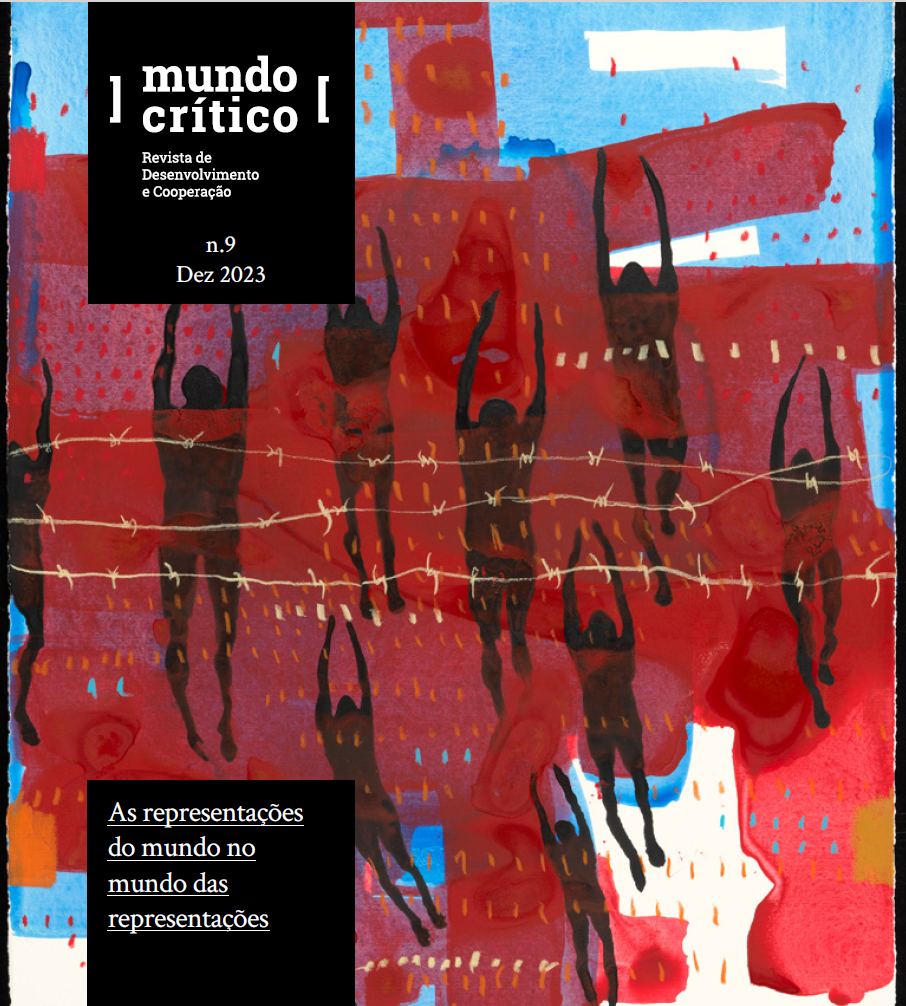
Mundo Crítico n.º 9: Representações do mundo no mundo das representações
Abstract:
The ninth edition of Mundo Crítico aims to critically analyse issues related to representations of the world and the relationships between the production and construction of visual and written narratives about the “other(s)”. This focus primarily, though not exclusively, stems from the field of “development support” organisations and journalism.
The edition opens with an “imperfect conversation” between Portuguese journalist António Rodrigues and Guinean activist and community leader Miguel de Barros. They discuss the need to bring forth a different idea of peripheries and alternative narratives, as well as the spectacle often made of cooperation and development.
The Knowledge and Circumstances section begins with Spanish journalist Alfonso Armada’s reflection on our society, drawing on Guy Debord’s warning about the transformation of politics and history into spectacles for consumption. Mozambican journalist Zenaida Machado sheds light on the situation in Cabo Delgado, Mozambique, where the plight of its people remains largely outside the “lens of international journalistic coverage,” overshadowed by the risks to multimillion-dollar investments in the region. From Guinea-Bissau, researcher Sumaila Jaló examines irregular migration through life stories turned into music, aiming to deconstruct prevailing perceptions of this reality. This section also features a reflection on the role of education for development and global citizenship, based on the Sinergias ED project, written by four researchers involved in the initiative. Finally, ACEP President Fátima Proença presents 10 proposals to change how NGOs communicate with society, striving for ethically grounded new narratives and information.
In Ways of Seeing, Mozambican photographer Yassmin Forte, winner of the 2023 Contemporary African Photography Prize, shares a photo essay inspired by her family’s history, beginning on the dance floor in Quelimane, Mozambique. Researcher Livia Apa explores how Senegalese television series contribute to portraying the country, while community leader Paulo Mendes reflects on the diaspora’s role in reshaping narratives about racism and the coloniser/colonised dichotomy.
In Innovations, we highlight an initiative by the Norwegian Fund for Students and Researchers that challenges the fundraising campaigns of international organisations. Meanwhile, in Graphic Echoes, illustrator Amanda Baeza offers a “two-act piece” bridging Chile and Portugal.
Finally, in Showcase, São Toméan audiovisual producer Katya Aragão and Guinean communication specialist Luana Pereira delve into books dedicated to hand-painted advertising in their respective countries, authored by a Polish graphic designer and researcher. They write inspired by and about these works.
The edition concludes with Leonor Teixeira’s review of a recent BOND guide on how NGO images should be used, always with the subjects in mind. The cover is by Guinean visual artist Nú Barreto, who created the piece especially for this edition. Happy reading!
Cite this Journal:
ACEP & CEsA (2023). “Representações do mundo no mundo das representações”. ISEG/CEsA – Centro de Estudos sobre África e Desenvolvimento. Revista Mundo Crítico nº 9 (Dez 2023). ISSN 2184-1926.
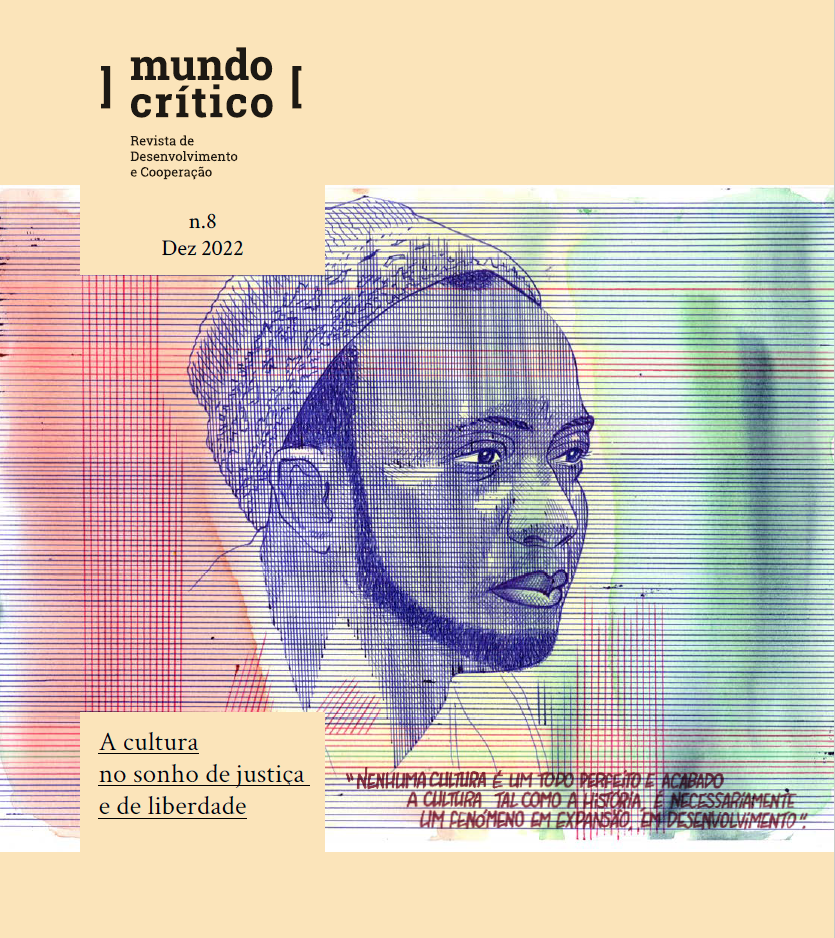
Mundo Crítico n.º 8: A cultura no sonho de justiça e de liberdade
Abstract:
In a turbulent world, the wisdom of our role models becomes even more crucial. When we recall the teachings of Amílcar Cabral, we realise how the global is intrinsically local. We hear about personality in terms of stance, behaviour, leadership, and charisma. These qualities emerge in the videos, photos, or recordings that captured the man, in the analyses shared by many, or even in the recognition of a BBC poll that ranked him among the most influential figures in contemporary global history. Yet, it is through reading his writings that young people today can truly grasp the intricate details of his character.
Cabral was not just a poet; he was a dreamer. Not just a guerrilla leader; he was a strategist. Not just a diplomat; he was a mobiliser. Not just a leader; he was a thinker. Not just a teacher; he was a custodian. Too many qualities for a single individual? Yet such is the nature of extraordinary people. They have flaws too; they are human, but they leave an indelible mark for being unique. And for bringing us hope.
In difficult times, we look in the rear-view mirror — a natural reaction for those who navigate an unclear future without clear boundaries or controlled speed. The past seems easier to interpret, though it was not necessarily easier to endure or confront.
After all, what could be harder to change today than what Cabral faced in his youth?
Organising a colonised people from nothing, in a marginalised territory, against an army that once had over 20,000 troops on the frontlines, equipped with significant air support, NATO logistics, and the diplomatic backing of powerful nations. Achieving a transcendental victory: paving the way for the liberation of Guinea and Cape Verde, fostering unity in Angola’s liberation movement, sparking a rebellion that ultimately dismantled fascism in Portugal, and inspiring a new wave of Pan-Africanist and revolutionary thought.
To his exceptional organisational skills, we must add his theoretical contributions. Examples include his conceptualisation of culture’s role in liberation, later expanded in Paulo Freire’s Pedagogy of the Oppressed; his transformation of the Marxist reading of class struggle to depict how a subjugated people embody a national class in their anti-colonial struggle—a thesis more sophisticated than the simplistic version of Kwame Nkrumah; his metaphorical interpretation of the ambiguous role of the petty bourgeoisie—today we might say the elites—in the post-colonial period, as agents of alienated practices, a notion further developed psychologically by Frantz Fanon; or his elaboration of a new concept of unity, attainable only through what he called revolutionary praxis—a stance for his time’s movements, distinct from the shallow populism underpinning many of today’s dissenters.
All of this, while speaking to peasants with the same ease he displayed on global platforms. To some, he used examples drawn from their simple daily lives — pots, land, homes, or forests — and to others, he offered the popular wisdom of African proverbs and riddles as a point of connection to that same reality.
Cabral wielded a magic in his words, employing comparisons, metaphors, and, above all, demonstrating through them a deep respect for others — without distinction by rank, gender, or race, as we would phrase it today.
May his life’s example and legacy help us to keep hope alive.
Cite this Journal:
ACEP & CEsA (2022). “A cultura no sonho de justiça e de liberdade”. ISEG/CEsA – Centro de Estudos sobre África e Desenvolvimento. Revista Mundo Crítico nº 8 (Dez 2022). ISSN 2184-1926.
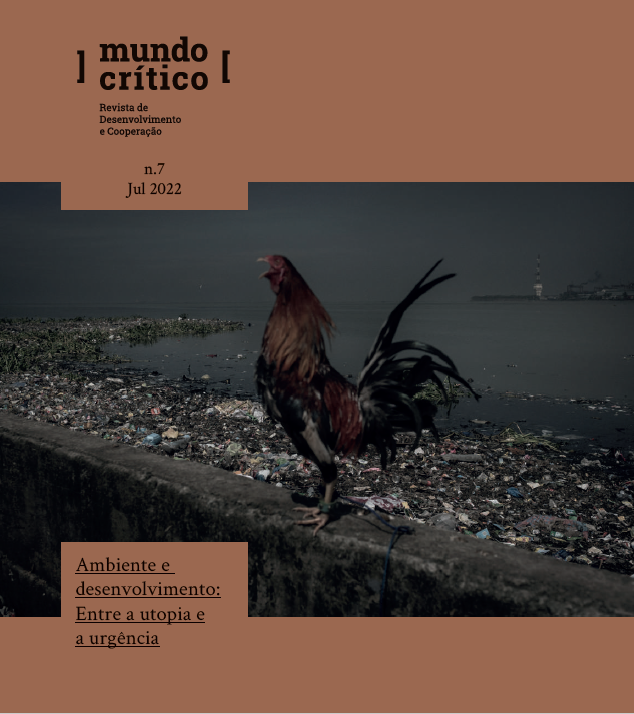
Mundo Crítico n.º 7: Ambiente e desenvolvimento: entre a utopia e a urgência
Abstract:
The overexploitation of the planet’s resources and unsustainable consumption habits have been causing environmental impacts that already constitute a true environmental emergency. One of its most visible manifestations is the unprecedented rise in global temperatures, leading to irreversible damage. In 2021, the international community gathered in Glasgow at COP26, where the climate emergency and the urgent need to phase out fossil fuel exploitation were acknowledged. However, the final agreement fell short of the required ambition.
According to calculations by civil society organizations, the agreed measures will limit warming to 2 degrees Celsius by the end of the century, surpassing the “red lines” of safety. Among the most affected are small island states and many developing countries, which have contributed the least to the current crisis. The upcoming COP27, to be held in Egypt, represents a crucial opportunity for many Africans.
In this edition, we discuss the challenges and emergencies related to development, the environment, and climate. We begin with an “imperfect conversation” between two experts with extensive experience in Africa and Latin America.
The “Knowledge and Circumstances” section includes a reflection by Luís Fazendeiro on “North”/”Global South” inequalities, an analysis by Romy Chevallier and Alex Benkenstein on the EU-AU Summit and climate (in)justice, and Patrícia Magalhães Ferreira’s critique of incoherent policies in these areas. This is followed by insights into experiences in São Tomé and Príncipe (Jorge Carvalho), Mozambique (Mariam Abbas and Natacha Bruna), and Guinea-Bissau (Aissa Regalla de Barros). The section concludes with a reflection on nature and climate by Flora Pereira da Silva.
In “Ways of Seeing”, Portuguese photographer Mário Cruz revisits the Pasig River in the heart of Manila, describing it as “an example of the dangerous path humanity is on.” One of his photos serves as the cover of this issue, as well as the centerfold.
The “Narratives” feature stories by Portuguese journalist Vanessa Rodrigues about the mobilization of rural women in Guinea-Bissau, Mozambican journalist Armando Nhantumbo’s account of how mega-projects are pushing populations into poverty, and environmentalist Sofia Guedes Vaz’s bicycle adventure to COP26.
In “Innovations”, Ana Filipa Oliveira introduces Fakebook-ECO, an initiative aimed at combating environmental disinformation.
Ukrainian illustrator Viktoriya Kurmayeva provides a visual depiction of “Mother Nature,” and in “Escaparate”, we recommend two reports: one on financing (presented by Rita Cavaco) and another on climate (by Tomás Nogueira). Happy reading!
Cite this Journal:
ACEP & CEsA (2022). “Ambiente e desenvolvimento: entre a utopia e a urgência”. ISEG/CEsA – Centro de Estudos sobre África e Desenvolvimento. Revista Mundo Crítico nº 7 (Jul 2022). ISSN 2184-1926.
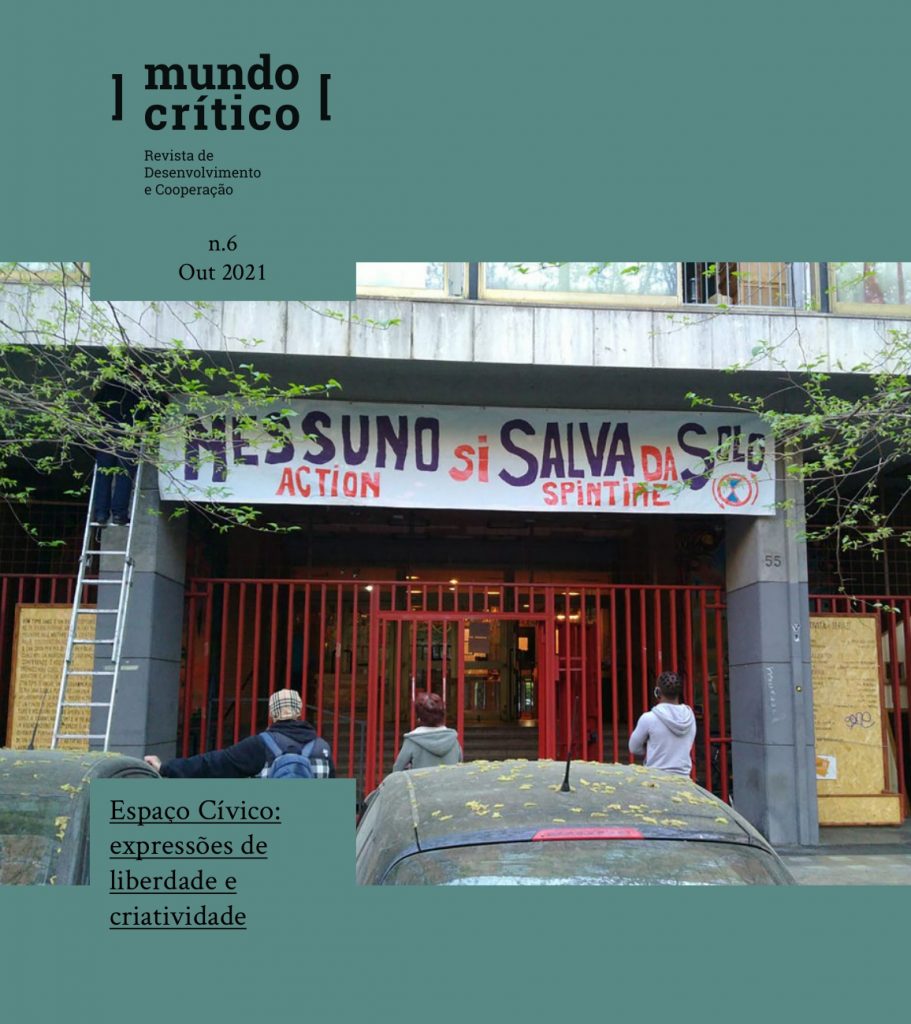
Mundo Crítico n.º 6: Espaço cívico: expressões de liberdade e criatividade
Abstract:
Civic space is one of the central pillars of democracies. The level of freedom with which citizens organize, participate, and intervene in society is a key indicator of the quality of civic space and democracy. In recent years, we have witnessed a progressive shrinking of civic space on a global scale. This has taken explicit forms, such as criminalizing the work of NGOs, persecuting activists, reducing channels of dialogue with state structures, or undermining public trust in NGOs. More subtle measures, like funding restrictions, have also played a role. The pandemic has exacerbated this trend, and in many parts of the world, under the pretext of protecting public health, civic space has faced significant setbacks.
In light of these developments, this edition of Mundo Crítico brings together reflections on the challenges facing the various spheres of civic space, exploring its multiple dimensions and how NGOs and other groups strive to overcome obstacles and expand their reach. The issue opens with a conversation between human rights professor Antoine Buyse and Mozambican activist Zenaida Machado about the challenges and potential of civic space.
The “Knowledge and Circumstances section” begins with an analysis by Marianna Belalba Barreto from the civil society alliance CIVICUS on the degree of openness in civic space. It is followed by an assessment of the experience of the Arab Spring through the perspective of someone who lived through Tahrir Square in Egypt 10 years ago, and an article by Mário Rui Marçal on Mosaiko’s contributions to building civic space in Angola. Another perspective on Angola is offered by journalist Domingos da Cruz, who addresses press freedom, and Miguel de Barros and Redy Wilson explore new expressions of citizenship in Praia and Bissau. Closing the dossier, journalist João Pedro Pereira warns of the “new dictators” of technology, and Paulo Illes and Patricia Gainza share insights from the World Social Forum on Migrations.
In “Ways of Seeing”, we are guided by Mohamed Keita to Mali, where, together with a group of young people, he has been photographing daily life as a starting point for education and cultural growth. The “Narratives” section includes stories by Livia Apa, about a Nigerian women’s theater group in Rome, and Paulo Daio, who reflects on the experience of the Kwame Sousa School in São Tomé and Príncipe.
In the “Innovations” section, writer Ondjaki highlights initiatives promoting reading in Luanda, and Eddie Avila discusses a project focused on reframing narratives. “Illustrator” José Smith Vargas occupies the pages of “Ecos Gráficos” in this edition, which concludes, as always, with the “Escaparate” section offering further reading suggestions.
Cite this Journal:
ACEP & CEsA (2021). “Espaço cívico: expressões de liberdade e criatividade”. ISEG/CEsA – Centro de Estudos sobre África e Desenvolvimento. Revista Mundo Crítico nº 6 (Out 2021). ISSN 2184-1926.
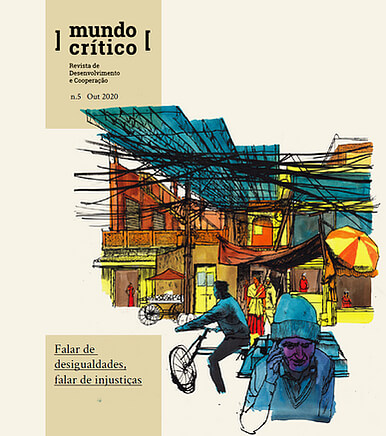
Mundo Crítico n.º 5: Falar de desigualdades, falar de injustiças
Abstract:
Is there no development without reducing inequalities? Or does worsening inequality not matter as long as poverty decreases and the majority’s situation improves? How do the various dimensions of inequality interconnect and reinforce one another? Do those involved in international cooperation have the legitimacy to intervene in such a fundamentally political domain, and how should they do so?
These were some of the questions that guided the creation of this edition of Mundo Crítico – Journal of Development and Cooperation, which, during its editorial selection process, was overtaken by the current pandemic crisis. COVID-19 has made it even more urgent to address inequalities — now more visible both within and between countries — forcing a reevaluation of key questions to answer the pressing inquiry: what now?
This edition begins with an “imperfect conversation” between Mozambican sociologist Elísio Macamo and Portuguese economist Rogério Roque Amaro, who both agree that inequality is fundamentally an issue of injustice. In the deeper reflection section, “Knowledge and Circumstances”, contributions include an analysis by Pedro Conceição, director of the Human Development Report Office at UNDP, and Pol Morillas, director of the Catalan think tank CIDOB, offering insights on current times and what lies ahead. Philosopher Viriato Soromenho-Marques explores the connection between the “environmental wreckage” and inequalities, while Brazilian researcher Luana Pinheiro discusses gender inequalities in the context of the pandemic. The dossier also features an analysis by sociologist Renato Miguel do Carmo on the labor market as an “inequality maker” and by researcher Daniel Roedel on development dependency. The section concludes with a piece by researcher Iolanda Évora on Afrodescendence and Europe in the 21st century.
The “Ways of Seeing” section focuses on People, through photographs by Adriano Miranda and Paulo Pimenta, documenting the profound asymmetries within a European country. In the “Narratives” section, journalist António Rodrigues delves into Hinacenda and the Herero people of Angola, Vanessa Rodrigues discusses the Mafalala Museum, and Vasco Veloso shares reflections as an international cooperation consultant.
In the “Innovations” section, the African Innovation Summit is introduced by one of its mentors, Cape Verdean economist José Brito, and Carlos Sangreman shares the experience of the Observatory of Rights in Guinea-Bissau. In “Ecos Gráficos”, illustrator Inês Cóias addresses the theme of rampant greed in The Little Entrepreneur. Finally, the “Escaparate” section offers additional reading suggestions on this topic.
Cite this Journal:
ACEP & CEsA (2020). “Falar de desigualdades, falar de injustiças”. ISEG/CEsA – Centro de Estudos sobre África e Desenvolvimento. Revista Mundo Crítico nº 5 (Out 2020). ISSN 2184-1926.
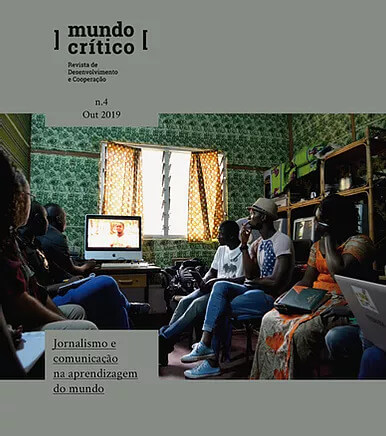
Mundo Crítico n.º 4: Jornalismo e comunicação na aprendizagem do mundo
Abstract:
How are Development issues represented in national and international media? What image — or images — of Africa are conveyed by the media? How can we avoid the “single story” about specific geographies and communities? What is the responsibility of the media, including new media and social networks, in the rise of populism in Europe and the USA and the spread of hate speech? And how can the relevance of development cooperation themes be promoted in traditional media as positive constructions of a shared future?
In this edition, Mundo Crítico – Journal of Development and Cooperation seeks to provide a space for reflection on the relationship between media, journalism, communication, and development, questioning whether there is a “journalism for development” and what contribution media and development cooperation can make to the necessary “learning of the world,” as described by Brazilian educator Paulo Freire.
We invited journalist Cândida Pinto and Mozambican anthropologist Euclides Gonçalves for an “imperfect conversation” about the current challenges facing journalism, the images produced about the African continent, and how development issues are (re)presented in Portuguese media. The “Knowledge and Circumstances” dossier features a collection of texts exploring the contribution of journalism to social change, journalism for development as a “bastard child,” the labyrinths of communication, and the role of communication for development. The section also includes reflections on media-sponsored journalist trips, the role of literature in “unsettling” narratives, and how refugees and migrants have been portrayed in European media, among other topics.
The “Ways of Seeing” section showcases the photographic perspective of writer Afonso Cruz on Iraq and Kuwait, and in the “Narratives” section, he shares the story of a street that serves as Baghdad’s third lung. Other narratives address the urgency of counterfactual thinking in contemporary times and the recurring story of Laovo Cande in the Mediterranean.
In the “Innovations” section, we highlight initiatives like the Journalism Creation Fund, which has enabled reporting on issues related to international development, and the Idemi project, which seeks to address the absence of African languages on the internet. In “Ecos Gráficos,” we confront the persistence of fake news on social networks (and in the media). Finally, as always, the “Escaparate” section offers additional reading suggestions on the topic of development cooperation.
Cite this Journal:
ACEP & CEsA (2019). “Jornalismo e comunicação na aprendizagem do mundo”. ISEG/CEsA – Centro de Estudos sobre África e Desenvolvimento. Revista Mundo Crítico nº 4 (Out 2019). ISSN 2184-1926.
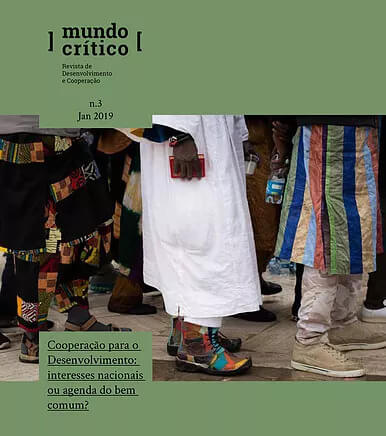
Mundo Crítico n.º 3: Cooperação para o Desenvolvimento: interesses nacionais ou agenda do bem comum?
Abstract:
This third edition of Mundo Crítico explores some of the pressing questions facing development cooperation today, both internationally and nationally. It aims to contribute to a diverse and multi-voiced portrait of a reality undergoing significant changes — conceptually, politically, and in practice — changes that may even challenge the very notion of cooperation as a core value in relations between geographic, political, and cultural spaces. The reasons behind the current turbulent times clearly extend beyond development cooperation itself, but the failure of certain models, or the inadequacy of others, in addressing contemporary challenges has led to their reevaluation within the broader scope of foreign policies in various states. This edition seeks to look to the future, contributing not only to a forward-looking reflection but also to a debate on the current state of Development Cooperation. It questions models, strategies, and narratives, aiming for political choices that we, as a society, can collectively identify with.
The issue begins with an “imperfect conversation”, adopting a critical tone, about the current trends in Development Cooperation and the pressing need to build sustainable local capacities. The “Knowledge and Circumstances” dossier opens with Six Questions on Portuguese Cooperation, a reflection by the Editorial Board aimed at fostering the necessary (and urgent) debate within the sector. The section features articles on diverse perspectives and approaches, including those of countries like China and Norway, recent decisions by Portuguese Cooperation regarding Official Development Assistance, and a reflection on the professionals of the “development industry,” the non-governmental sector in the PALOP countries, and the changes and actions of NGOs in Angola. Additionally, the issue includes an article on women in comics, opening pathways for cooperation and solidarity.
The “Ways of Seeing” section focuses on migration to Europe through the lens of Italian photographer Mario Badagliacca, showcasing objects brought by migrants landing in Lampedusa. The Narratives section presents two journalistic works: one on the Jamaica neighborhood in Portugal and another on a reunion in Ethiopia following the peace agreement with Eritrea.
We revisit the “Innovations” section (introduced in the first issue), with examples of processes promoting human rights in Guinea-Bissau and within the CPLP, as well as cooperation in education between Portugal and Mozambique. The edition concludes with “Ecos Gráficos”, featuring comics, and a curated selection of reading suggestions in Escaparate focused on the current state of Development Cooperation.
Cite this Journal:
ACEP & CEsA (2019). “Cooperação para o Desenvolvimento: interesses nacionais ou agenda do bem comum?”. ISEG/CEsA – Centro de Estudos sobre África e Desenvolvimento. Revista Mundo Crítico nº 3 (Jan 2019). ISSN 2184-1926.
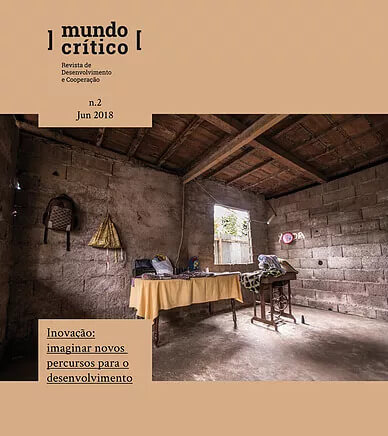
Mundo Crítico n.º 2: Inovação: imaginar novos percursos para o desenvolvimento
Abstract:
What is “new” in “innovation and development”? This question served as the starting point for the challenge we posed in this second edition of Mundo Crítico, aiming to intersect diverse practices, experiences, and perspectives on the “innovation” agenda within international development cooperation.
Perhaps the greatest potential of the international “innovation and development” agenda lies in questioning the dichotomous logics that permeate relationships between “developed countries” and “developing countries.” These dynamics often conceive the former as spaces of “invention, recreation, or renewal” of theories, technologies, or organizational models, and the latter as mere recipients, importing products, values, and ideas. In light of the transformations in the world we live in and the uncertainties surrounding its direction and impacts, it becomes imperative to question what is truly “new” in “innovation and development”—recovering memory, observing the present, and daring to glimpse the future.
This edition begins with an “Imperfect Conversation” about the various dimensions of innovation, which go far beyond mere technological aspects. Social innovation must be accompanied by organizational innovation, fostering a process-oriented approach for truly inclusive and change-oriented development. In the dossier of “Knowledge and Circumstances”, reflective articles explore experiences and practices of innovation for development, including initiatives in creative economies in countries like Cape Verde, Guinea-Bissau, and São Tomé and Príncipe; cash transfers in humanitarian aid contexts; and a project to improve the quality of education in Latin America through school lighting, to name just a few examples. The “Ways of Seeing” section features a photographic dossier showcasing the faces of women from São Tomé and Príncipe, resulting from a project affirming the rights of Santomean women. The “Narratives” section presents practical cases and protagonists who leverage innovation and creativity to tackle diverse challenges.
Finally, we introduce a new section — Ecos Gráficos — dedicated to comics, as well as Escaparate, which serves as a gateway to further readings.
Cite this Journal:
ACEP & CEsA (2018). “Inovação: imaginar novos percursos para o desenvolvimento”. ISEG/CEsA – Centro de Estudos sobre África e Desenvolvimento. Revista Mundo Crítico nº 2 (Jun 2018). ISSN 2184-1926.





